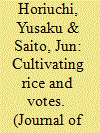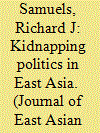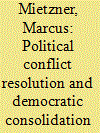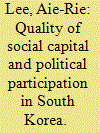| Srl | Item |
| 1 |
ID:
100267


|
|
|
|
|
| Publication |
2010.
|
| Summary/Abstract |
We explore in this article an institutional foundation of agricultural protectionism in Japan, a country long recognized as resisting international pressures to open up its rice market. Using our qualitative analysis of postwar politics of agricultural protectionism and a simple formal model, we argue that farmers in Japan have stronger incentives to mobilize electoral support for the governing party in multimember district systems than in single-member district systems, because the marginal effects of mobilization on policy benefits are different under these electoral systems. Our empirical findings corroborate this claim and provide implications for the gradual changes in Japan's farm policies occurring after the electoral reform in 1994.
|
|
|
|
|
|
|
|
|
|
|
|
|
|
|
|
| 2 |
ID:
100263


|
|
|
|
|
| Publication |
2010.
|
| Summary/Abstract |
In this article, I examine two contemporary cases in which the same foreign adversary, North Korea (DPRK), violated the sovereignty of neighboring states. I use a comparison of South Korean and Japanese reactions to political captivity to assess institutional performance in democratic states and ways in which these dynamics are connected to international politics. We see how "captivity narratives" can be differentially constructed and deployed and how policy capture can be achieved by determined political actors. Civic groups in both countries worked to mobilize political support, frame the issue for the media, and force policy change. In Japan, politicians were more willing to use the abduction issue for domestic political gain than in Korea, where the political class was determined to prevent human rights issues (including abductions) from interfering with their larger political agenda, including improved relations with the DPRK.
|
|
|
|
|
|
|
|
|
|
|
|
|
|
|
|
| 3 |
ID:
100265


|
|
|
|
|
| Publication |
2010.
|
| Summary/Abstract |
This article argues that Indonesia's Constitutional Court has played a significant role in that country's transformation from a violence-prone polity into Southeast Asia's most stable democracy. The Court has advanced institutional conflict resolution mechanisms and expanded democratic rights-two achievements identified by Linz and Stepan as major indicators of a consolidating democracy. Building on models developed by Ginsburg and Horowitz, my analysis also illustrates why the Court has been able to defend its autonomy and become an agent of democratization. While sharing Ginsburg's emphasis on high levels of power diffusion as a key reason for the Court's success, this article moves beyond such an approach. Most importantly, it suggests that the judges' "judicial activism"-as expressed in a number of controversial but popular decision-increased Indonesian society's support for the Court to such an extent that is has now become largely invulnerable to attempts of external intervention.
|
|
|
|
|
|
|
|
|
|
|
|
|
|
|
|
| 4 |
ID:
100269


|
|
|
|
|
| Publication |
2010.
|
| Summary/Abstract |
Extant research on immigrant incorporation pays little attention to variations among immigrants from the same ethnic origin. A main purpose of this study is to address this research void by exploring how differences in the pre-emigration socialization context for immigrants from a politically divided homeland may affect their participation in mainstream-oriented and homeland-regarded poli-tics. I posit that experiences Asian immigrants have in different political systems before crossing the Pacific may result in different relationships they maintain with their homeland as well as different attitudes toward homeland government and policies they develop after the crossing; and this, in turn, may affect how much they participate in politics on both sides of the Pacific. However, through the process of resocialization, I also suggest immigrants' political behavior may be influenced by their degree of exposure to the host society as well as by their connectedness with its institutions. Using data from the 2007 Chinese American Homeland Politics survey, I focus on the experiences of US immigrants of Chinese descent from China, Taiwan, and Hong Kong to test these hypotheses.
|
|
|
|
|
|
|
|
|
|
|
|
|
|
|
|
| 5 |
ID:
100271


|
|
|
|
|
| Publication |
2010.
|
| Summary/Abstract |
Previous research claims that associational membership produces social capital. Employing the first wave of the Asian Barometer Survey conducted in 2003, this study investigates the development of social capital and its political consequences in South Korea. Rather than study simple association membership, I examine the quality of civil society (defined as associational commitment and interaction) that individuals pursue through membership. This, I believe, provides a close test of the theoretical impact of social interactions on political participation. The findings indicate that there is a positive association between voluntary activity and two modes of political activity (voting and campaign participation) in different ways and to varying degrees. Associational membership is a significant predictor of voting. In the case of the quality of social capital, associational interaction (talking politics with group members) turns out to be significant in encouraging participation in election campaigns. Overall, my findings on the role of social capital support Putnam's argument that group interactions foster democratic participation.
|
|
|
|
|
|
|
|
|
|
|
|
|
|
|
|